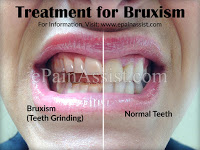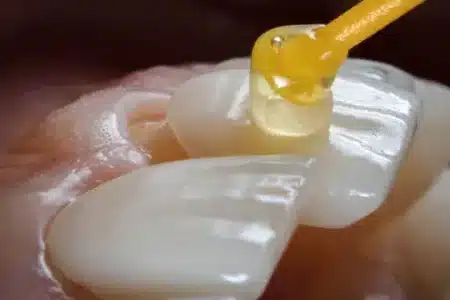Bruxism is a common condition that causes your teeth to grind or clench involuntarily. It can be uncomfortable, but it’s also surprisingly common – and we’re not just talking about your parents and grandparents. In fact, even young adults are at risk for bruxism if they’re experiencing stress or sleep problems; one study found that up to 30 percent of college students experience the signs of bruxism.
So how do you know if you’re grinding your teeth in the first place? And what can you do about it? In this article, we’ll explore these questions and more.
What is bruxism?
The term Bruxism (grinding your teeth) is a condition in which you grind or clench your teeth. It can occur during sleep, when you’re awake, or both.
Bruxism causes damage to the teeth and the surrounding bone and soft tissues in the jaw; it is also associated with headaches and neck pain. Most people don’t know they have bruxism until they experience symptoms like toothache, gum recession, tooth wear/loss or headaches.
While there’s no cure for bruxism itself, there are ways to manage it using special dental appliances such as night guards if necessary. In this guide, we’ll cover what causes bruxism so you can take steps toward managing your condition on your own.
What causes bruxism?
There are a number of reasons why a person might develop bruxism. Stress, anxiety, and depression can lead to muscle tension in the jaw that causes teeth grinding. Sleep deprivation is another common cause of bruxism. If you’re not getting enough sleep at night, you may have trouble relaxing your facial muscles and clenching your teeth as you fall asleep – even if they were okay during the day when they had more energy available to them.
TMJ disorder (temporomandibular joint disorder) is another cause of bruxism; this condition involves pain in the jaw or face caused by inflammation around those joints, which causes muscle spasms that lead to grinding of the teeth at night or when awake. Medications can also be responsible for triggering episodes of grinding; antidepressants like Prozac and Zoloft are notorious culprits because they either increase serotonin levels (which relaxes nerves) or decrease serotonin levels (which increases stress).
Treatment should start with making sure that any ill-fitting dentures are replaced before looking into other potential causes like mouth breathing and smoking habits – two things that have been shown time after time again to cause problems with oral health overall.
How can you tell if you’re grinding your teeth?
To determine whether you grind your teeth at night, there are a few things to look for:
- Look at your teeth: The wear of your teeth is the most obvious sign of bruxism. The grinding of the upper and lower jaw can lead to extreme tooth wear on one side of the mouth, which causes an uneven bite. If you notice that one side of your mouth has more gaps than the other and looks like it’s been chewed up by a shark, this may be due to bruxism.
- Examine alignment: Another possible sign is a misalignment in some or all of your top front teeth (the incisors). This could be caused by clenching them together too tightly during sleep and causing them to shift over time—a condition known as malocclusion.
- Inspect for a wry smile: It’s possible that if you clench during sleep, it will cause asymmetry between your two sides when viewed from above (this can also indicate jaw misalignment).
If I’m not experiencing pain, should I still be worried?
While not everyone who grinds their teeth experiences pain, bruxism can have serious consequences for your overall health. Bruxism can cause tooth wear, gum recession and jaw pain – and it also has been linked to headaches. If you’re grinding your teeth but aren’t experiencing symptoms of pain or other problems like sleep disruption or neck stiffness, be sure to talk with your dentist about getting fitted for a night guard or bite splint so that you can prevent issues from developing further. Your dentist is trained in how to diagnose and treat tooth grinding without making an uncomfortable visit unnecessarily painful.
What are the risks of untreated bruxism?
If you have bruxism and don’t treat it, you may experience long-term dental and jaw damage. Teeth grinding can cause your teeth to become discolored or worn down. You may also develop cracks in your teeth. If left untreated, this condition can lead to tooth loss.
Long-term jaw pain is another major risk of untreated bruxism. The repetitive grinding can cause chronic TMJ (temporomandibular joint disorder), which affects the joints in the jawbone connected to your cheeks and lips that allow for opening and closing your mouth comfortably. Congestion from clenching or grinding can lead to headaches and neck pain as well, both of which are common symptoms associated with bruxism that should be discussed with a doctor if they persist for more than two weeks at a time
Are there ways to treat bruxism?
There are many options to treat bruxism. One option is a mouthguard. A dental appliance called a “mouth guard” can be fitted by a dentist and worn over your teeth at night. Mouthguards can also be worn during the day if desired. These appliances are not expensive, comfortable to wear, easy to clean and safe – and they have no side effects. For people that need a remedy to bruxism MYMOFO Smile night guards are a great solution.
After reading this article, you should be more knowledgeable about bruxism. What it is and how to treat it. We hope that this information will help you make an informed decision on whether it’s something that could be affecting your sleep and/or oral health.





